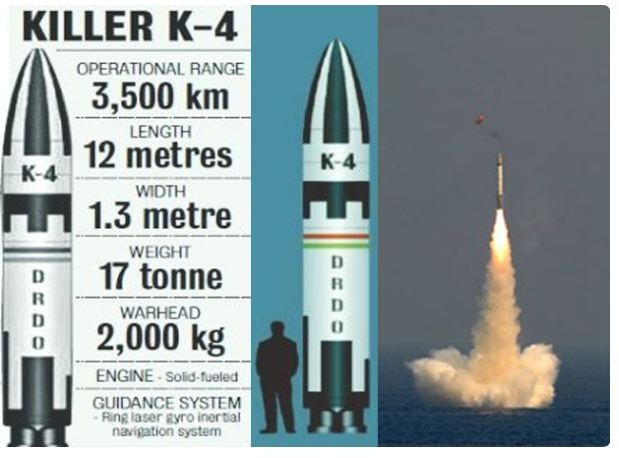India will soon conduct a second test of its new K-4 nuclear capable intermediate-range, submarine-launched ballistic missile (SLBM) as it seeks to develop a nuclear second strike capability against both China and Pakistan.
The first test of this SLBM designed by the Defense Research and Development Organization (DRDO) was successfully conducted in 2014. K-4 was designed to deploy on the new Arihant class (the Sanskrit word for "Killer of Enemies") nuclear ballistic missile submarine (SSBN).
The lead ship of this class, INS Arihant, was commissioned into the Indian Navy (IN) in August 2016. It now only needs the K-4 to fulfill its main role as a nuclear deterrent to China and Pakistan.
India plans to build five Arihant-class subs. Each of these SSBNs can carry four K-4 SLBMs or 15 K-15 Sagarika nuclear SLBMs with a range of 750 km.
With a reported range of 3,500 km, a K-4 launched from the Bay of Bengal can send its 2.5 kiloton nuclear warhead to targets as far away as Islamabad, which is over 2,700 km away. Beijing, which is 4,000 km distant, is out of reach of the K-4, however.
Military analysts say an Arihant-class SSBN can launch its K-4 payload from the safety of the Bay of Bengal protected by warships of the IN against enemy attack submarines. It can also launch its K-4s from the waters off India's Andaman and Nicobar Islands, also in the Bay of Bengal, protected by warships and planes of the Andaman and Nicobar Command based at Port Blair.
Analysts said the Indian Navy will reinforce the Andaman and Nicobar Command to attain this aim. A tri-service theater command, the Andaman and Nicobar Command has anywhere from 10 to 20 navy warships assigned to it.
It also has two navy bases, four bases for the Indian Air Force and the Indian Naval Air Arm and bases for two Indian Army brigades.






















